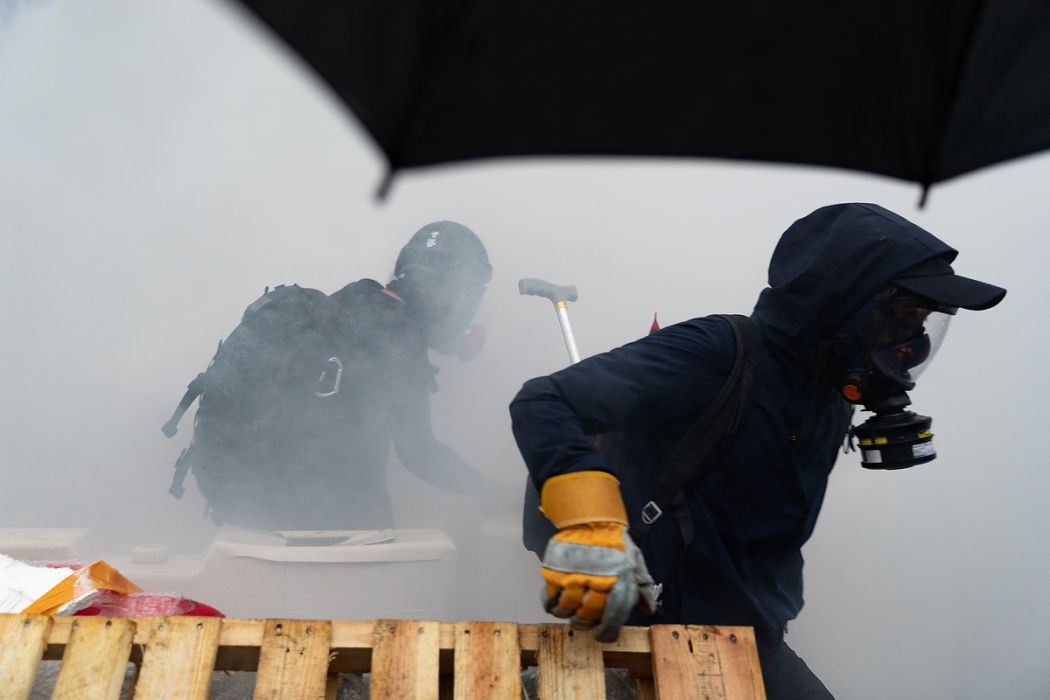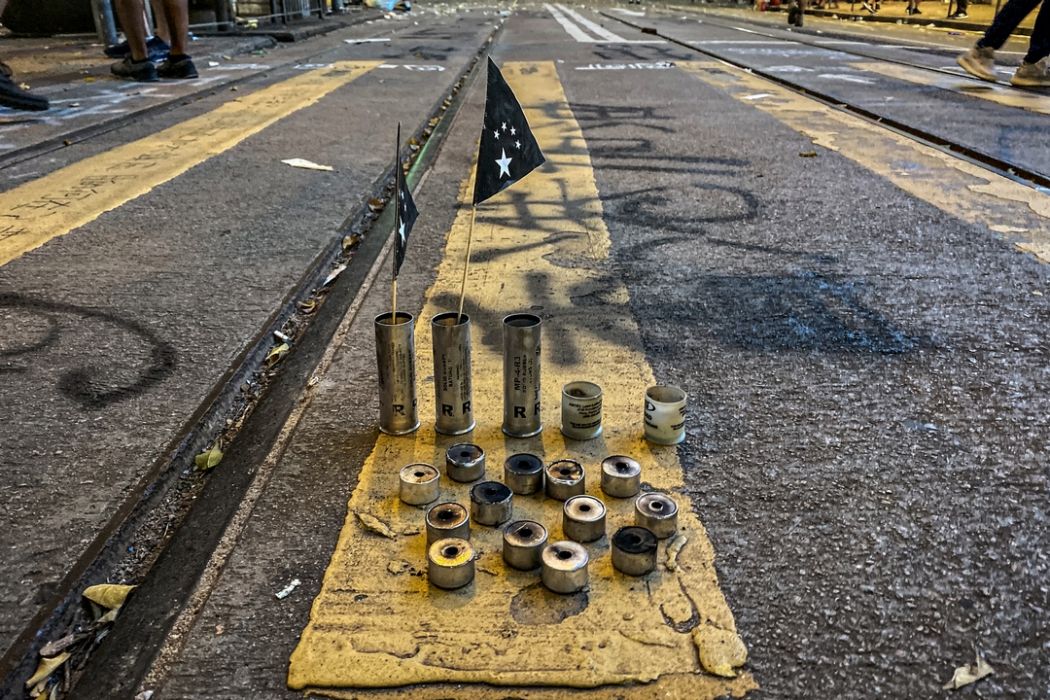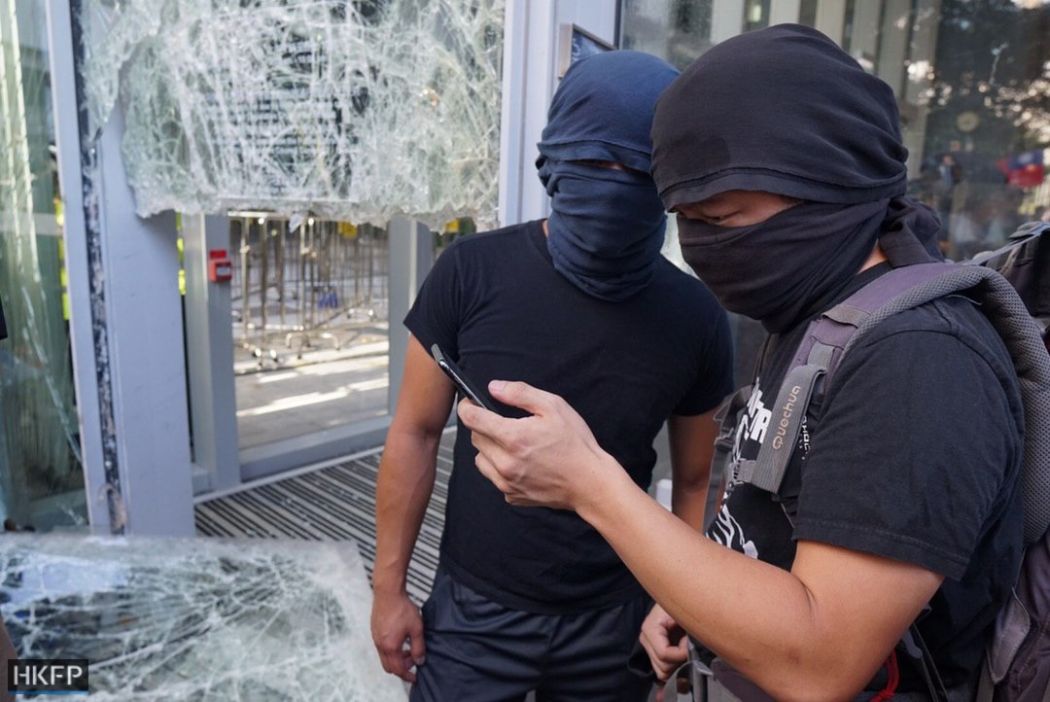The first panic attack took place two weeks after Sarah (not her real name) was caught in the middle of an evening protest in Admiralty on September 29, during which multiple rounds of tear-gas were fired by the police.
“I’ve never felt afraid for my life. I’ve always been brave,” she told HKFP. “I’ve always been the one that encourages people to stay, despite the threat of tear-gas.”

For most of her life, Sarah, a third-generation Hongkonger, has felt emboldened to “stand up for what is right.” She went to her first protest in 2003, together with nearly 700,000 other people, to oppose Article 23. Only 12 years old at the time, she doesn’t remember much of the march but recalled feeling empowered walking through the streets with her parents – both of whom were journalists and encouraged her to speak her mind from a young age.
During the 2014 Umbrella Movement calling for universal suffrage, Sarah said she felt it was her duty to once again to take to the streets to show her support. She would buy supplies, donate food and water, and help with stocking the book library in Tamar Park in Admiralty.
And throughout this year’s summer of dissent, she has played what she said was a “middle-person role.”
Not on the frontline, but not trailing behind either, Sarah is usually part of a group that holds up open umbrellas to “shield protesters” while they remove road barriers, or commit acts of vandalism. When she’s not covering protesters, she helps with translation, as well as provides food and water for frontliners.
But that evening in Admiralty was a turning point for Sarah. The sounds, smells and memories of being “totally trapped” would set off multiple panic attacks caused by “extreme fear and terror.”
“[The police] closed all the walkways out of Admiralty, and we couldn’t run anywhere,” she says. “And the amount of tear gas that was fired was totally inhumane. It sounds dramatic but I really thought this was the end, and that I was going to die there.”

Two weeks later, Sarah would be triggered by the sound of a popping balloon at a child’s birthday party. She started crying uncontrollably, and soon couldn’t breathe.
Not long after that, a friend who startled Sarah by walking up to her from behind prompted another panic attack. She has also experienced distressing nightmares, which included images of police in riot gear and guns.
“Now any loud noises are a trigger for me,” she says. “The thing is, when you’re at a protest and hear rounds of tear gas being fired, you don’t know whether they’re rubber bullets, bean bag rounds or even live rounds.”
Sarah saw a therapist about these episodes and was told that they were symptomatic of post-traumatic stress disorder (PTSD), caused by stressful or particularly traumatic events.
Hong Kong has experienced waves of mass protests since summer, initiated by the now-shelved extradition bill, which would have allowed case-by-case fugitive transfers to mainland China. Over the course of over six months, peaceful protests have morphed into sometimes violent displays of dissent over alleged police brutality, Beijing’s encroachment into the city, and other community grievances.
Since June, the police have fired more than 12,000 rounds of tear gas, more than 6,000 rounds of rubber bullets and 19 live rounds. Three people have been shot with live-rounds by officers – two of whom were left in critical condition and required emergency operations. A university student died from a head injury after falling from a car park near police-protester clashes. Another 70-year-old man died after he was hit in the head with a brick during a skirmish with masked protesters, and a 57-year-old man was left in a critical condition after being set on fire during a confrontation with protesters.

The physical wounds of recent clashes are clearly visible, but in a society that continues to stigmatise mental health problems, the psychological trauma will leave a harmful – yet hidden – effect on Hong Kong people.
‘A mental health crisis’
According to psychiatrist Dr Phyllis Chan, Hong Kong will “absolutely experience a mental health crisis.”
She said that it is not just active protesters who could experience PTSD symptoms, but even those watching events unfold on the news, who live in affected areas, or work in jobs that are related to the movement – for example nurses, doctors, reporters, police, and street cleaners.
Chan, together with a group from the Hong Kong College of Psychiatrists, runs “Care4ALL,” a mental health programme that provides subsidised consultations for people who are experiencing mental health problems directly related to the unrest.
“This is an ongoing, unpredictable movement,” she said. “There’s something new happening every day and this will cause multiple stress-related disorders as it’s ongoing.”
Chan said that there are different levels of stress-related disorders that members of the public ought to be aware of. Those who have experienced traumatic events may develop an anxiety disorder called acute stress disorder, with symptoms emerging within hours or days after exposure to the event.
“Most of the time, these are short-term symptoms and can be cured with ongoing therapy within a few months,” Chan said.

But if the symptoms persist for more than four weeks, the condition becomes known as PTSD. This can take the form of intrusive memories, changes in mood, slipping into a dissociative state, depression and suicidal tendencies, according to Chan. Some experience delayed symptoms, and often they will be unaware of their condition. When this happens, PTSD is more difficult to treat, Chan said.
Since “Care4ALL” was launched on August 19, more than 160 calls have been made to the platform’s hotline, and more than 50 people have been deemed eligible to meet with professionals. Of this number, a handful have already displayed PTSD symptoms.
Parallel movements
PTSD has been reported amidst people involved in various prominent protest movements around the world.
Ukraine witnessed an uprising in 2014, similar to Hong Kong’s pro-democracy movement known as the Umbrella Revolution. The pro-European, anti-Russian protests started off as peaceful, before descending into violence and bloodshed. Reports of PTSD cases have since come to light, among war veterans, priests and others involved.
Thailand’s polarised politics led to large-scale protests from 2010-2014, leaving more than 90 people dead in 2010, and thousands of others injured afterwards. The demonstrations were organised by pro-democracy group the National United Front of Democracy Against Dictatorship – known as the “red shirts” – which believed that attempts by the military to control Thai politics were a threat to democracy.

Nick Nostitz, a journalist and photographer who covered the crackdown, told HKFP he developed PTSD more than six months after the military coup in May 2014.
“The symptoms were panic attacks, severe sleep issues, and hypervigilance,” he said. “I couldn’t go to certain places, and had recurring nightmares.”
During the unrest in Thailand, Nostitz became a target for the “yellow-shirts” – a group of royalists and ultra-nationalists known as the People’s Alliance for Democracy (PAD). They said his reporting was biased and accused him of being a “red shirt.”
“The tipping point was in November 2013, when I was targeted by the PAD,” he says. “I was beaten by a mob, and they attempted to abduct me, with the aim to torture and possibly kill me.”
The assault – which left him with cuts and bruises but not hospitalised – caused him to fear for his life.
Nostitz visited a hospital in Thailand for recurring panic attacks, where doctors diagnosed him with PTSD. But he said lack of awareness about the condition meant that he wasn’t given adequate support, and was just prescribed Valium.
Though Nostitz filed legal cases against those who assaulted him, none was investigated.
“The police said my case had been forwarded to the Department of Special Investigation (DSI), but when I asked the DSI, they told me they had never received the case,” he said. “They told me [the cases] would only see the light of day if the government changes.”
This lack of justice, according to him, contributed to his PTSD: “If you lose the fight, the feeling of failure can significantly affect your symptoms,” he said. “It affected me a lot. I was in a very bad way.”

Nostitz added that he knows of many journalists, protesters, and police officers who suffered gravely from PTSD. He said that some of his protester friends even developed symptoms in prison, where they weren’t offered any mental health support.
“The protests affected everyone,” he says. “Thailand is full of traumatised people and there is such little awareness of PTSD.”
In 2016, Nostitz left Thailand for Germany with his wife and son, after 23 years of living and working in the country, for the sake of his physical and mental wellbeing. In his new country of residence, he sought proper counselling and is no longer on medication to alleviate his symptoms. He has since become an outspoken advocate about mental health conditions and is using his story to help others in similar positions.
“Your mental health and well-being [are] the most important,” Nostitz said. “Never ever be scared to say that you’ve had enough or need some time off.”
A fear of ‘weakness’
Few frontline protesters in Hong Kong are willing to recognise – or accept – that the pro-democracy movement is adversely impacting their mental health at all.
Chan said one of her clients – a 16-year-old frontliner – has started to exhibit delayed PTSD symptoms.
“He tells me he is a good fighter,” she says. “He is at the absolute frontline, and has witnessed people being beaten, and might sometimes partake in violent acts.”
He asked Chan to prescribe him sleeping pills after experiencing distressing flashbacks and nightmares.

Recently, while on the frontline, he told Chan that he felt like he was in a “dream-like state” during violent clashes with the police.
“He doesn’t feel anything; no pain, nothing,” says Chan. “He says he fights better because he doesn’t feel the pain.”
This, according to Chan, is what is known as a dissociative state, and is a common symptom of PTSD.
Chan said that fighting others and watching others getting beaten up is highly unusual, and could cause severe mental health consequences. Although she had advised her client to rest, he insisted on going back to the demonstrations.
“The idea of appearing weak or ‘betraying’ his friends compelled him to return [to the frontline],” she said.
Chan added another one of her clients, who suffers from obsessive-compulsive disorder (OCD), performs administrative duties for protesters on Telegram. He also keeps check of police whereabouts on live streams at home and is in charge of relaying information to his friends on the frontline. His OCD has become worse in recent months.
“He has to double and triple check every message that he sends. He is very scared of sending the wrong information,” she said. “He doesn’t want to be the reason someone will get into trouble.”

He has experienced increased intrusive thoughts and compulsions, severely interrupting his day-to-day life, causing trouble sleeping, according to Chan.
“Despite telling him to devote less time to such duties, he is hesitant to stop,” she said. “There is a big fear of betrayal and appearing weak.”
Chan also said that although her clients feel discouraged about the course of the movement, quitting isn’t an option for them.
Moving forward with little hope
Sarah said she has grown to feel despondent and doesn’t feel optimistic about Hong Kong’s protest movement anymore.
“I don’t trust the government, I don’t trust the police,” she said. “We had two million people on the streets. It didn’t do anything. I don’t have faith in anything right now.”

Sarah also admitted that reading traumatic news now doesn’t rile her up in the way it used to. She said she believed that being “desensitised” by a constant cycle of violence was because she felt helpless. Though she said she will sometimes still attend protests, she disclosed that she now feels powerless, as opposed to empowered, like she was before.
“It’s this feeling that nothing you do matters,” she added. “We don’t think anything is going to change, but at least we went down with a fight.”
Hong Kong Free Press relies on direct reader support. Help safeguard independent journalism and press freedom as we invest more in freelancers, overtime, safety gear & insurance during this summer’s protests. 10 ways to support us.

